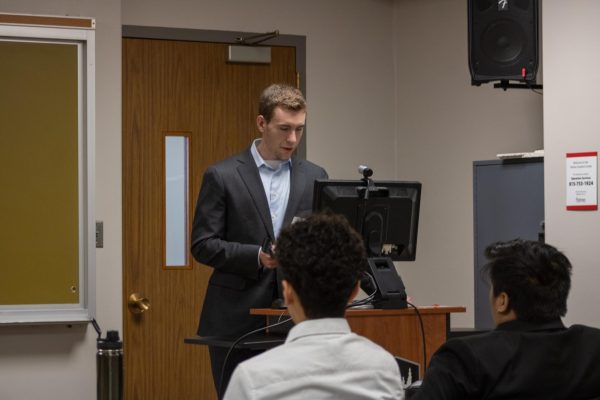UHS offers meningitis vaccine
November 6, 2003
Although the word “meningitis” isn’t that common at NIU, prevention of the disease is something health officials take seriously.
The deadly disease is an infection of the fluid that surrounds a person’s spinal cord and brain, said Julie Robertson, associate nursing professor at NIU.
Meningitis comes in two forms: viral and bacterial.
“Viral meningitis is less severe and usually resolves without treatment,” Robertson said. “Bacterial meningitis, however, can be fatal and must be treated as soon as possible.”
Peg Carroll is the coordinator of DeKalb’s communicable diseases program. She said only one case of bacterial meningitis has been reported at NIU since 2002.
“When I hear someone has bacterial meningitis, I contact [University] Health Service,” Carroll said. “I try to identify close contacts to that individual and recommend treatment.”
Robertson said there is a wide range of symptoms associated with both kinds of meningitis, including severe headaches, high temperature and stiff neck, to name a few.
“There also may be a rash, which appears as small clusters of tiny pinpricks and can begin on any part of the body,” Robertson said. “The rash is purple in color and will not turn white if pressed.”
The rash, Robertson said, is an indicator of blood poisoning, and the person would need to be taken into a hospital for medical treatment.
Robertson said although meningitis is a serious disease, it can be prevented.
“Meningitis is spread via respiratory secretions and requires close contact such as coughing and sneezing,” Robertson said. “However, it is not highly contagious and only close contacts, such as family, are at significant risk.”
Meningitis can be prevented through a shot, though it is not required for incoming freshmen.
“I recommend getting the shot if someone lived in close living contact,” Carroll said.
Robertson also said to prevent meningitis, students should practice good hygiene at all times, such as washing hands frequently, not sharing drinking glasses and covering one’s mouth when coughing or sneezing.













